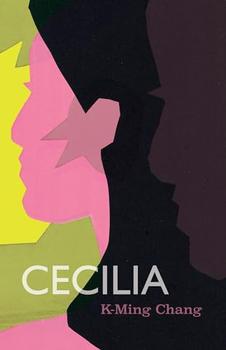Summary | Excerpt | Reviews | Beyond the book | Read-Alikes | Genres & Themes | Author Bio

In the first few pages of K-Ming Chang's bizarre yet engrossing novella Cecilia, Seven, the repressed chiropractor's assistant who serves as our narrator, discusses the respective urine streams of the doctor ("insistent," "unflagging," possessing "volcanic power") and the receptionist (near-silent, imagined as "a rain like bestial breathing"). She also reflects upon the "bouquet of dark hair" gathered by the vacuum cleaner and relates that her brother hides money in his crusty old socks to ward off thieves: "[I]n my family, we weaponized our stench."
All this is before she reunites with the titular Cecilia, a childhood friend who sends her into erotic overdrive. Seven recalls memories of her youth spiked with surrealism and grotesquerie, which meshes with the narrative's feral sexual longing in ways that might repulse readers of a sensitive disposition: Cecilia's spit turning into fish, which Seven privately imagines frying "in pans of my sweat"; brief digressions where Seven fantasizes about being a Chinese emperor and impregnating her concubine Cecilia with melon seeds; a teenaged Cecilia pulling a pubic hair out from her behind, "with globs of shit pearling it."
Cecilia is filled with this kind of imagery: decomposing animals, bodily functions and dysfunctions, intestines left in dumpsters and protruding from anuses. But unlike, say, Ottessa Moshfegh, it never feels like Chang is trying to push buttons. There is no detachment here, no ironic remove, and certainly no judgment: she places the reader right in the thick of her protagonist's obsession, overwhelming us with the strength of her imagery and daring us not to feel the same as Seven.
Cecilia bounces back and forth in time between a bus ride shared by Seven and Cecilia as adults and Seven's childhood memories leading up to a climactic sexual encounter. Chang depicts their upbringing with loving specificity — their time playing together in the laundromat or arcade, Seven's eccentric mother and grandmother (who could be compelling protagonists for other novels) — while also noting the seeds of the shame that eventually drive the two apart for some time: the way girls are defined by their capacity for childbirth well before puberty, as well as an errant comment from a peer about how "there is no difference between doing something and dreaming it." Seven's thoughts continue at a steady boil throughout the story, but the lid of her repression isn't lifted until the very end.
In broad strokes, Cecilia's story is a familiar one: girlhood friends pushed apart by an inability to deal with their burgeoning sexuality, reunited years later. But Chang's prose, as well as her willingness to dig her fingers into the fertile soil of her protagonists, truly sets it apart. There is nothing polished or sanitized about the desire this novella puts on display, none of the gauzy, soft-focus sensuality of lesser lesbian fiction. With something unmentionable caked under its fingernails, Cecilia clutches at the reader and refuses to let go.
![]() This review
first ran in the June 5, 2024
issue of BookBrowse Recommends.
This review
first ran in the June 5, 2024
issue of BookBrowse Recommends.

If you liked Cecilia, try these:

by Miranda July
Published 2025
The New York Times bestselling author returns with an irreverently sexy, tender, hilarious and surprising novel about a woman upending her life

by Saou Ichikawa
Published 2025
A bombshell bestseller in Japan, a provocative, defiant debut novel about a young woman in a care home seeking autonomy and the full possibilities of her life—"a darkly funny portrait of disability" (Japan Times)
Your guide toexceptional books
BookBrowse seeks out and recommends the best in contemporary fiction and nonfiction—books that not only engage and entertain but also deepen our understanding of ourselves and the world around us.